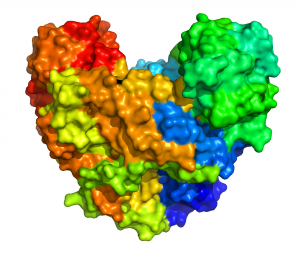There is an increased interest in the development of innovative strategies to combat Neglected Tropical Diseases (NTDs) due to the appearance of resistance to current medicines and the fact that NTDs affect approximately one-sixth of the world’s population. The Drennan lab, in collaboration with the Nonato lab at the University of Sao Paulo, are investigating class I (iron-sulfur cluster containing) fumarate hydratase (FH) from Leishmania major, the parasite responsible for cutaneous leishmaniases. FHs play crucial roles in parasite metabolism and are distinct from the class II FHs that are found in humans. The latter suggests that selective inhibition of class I FHs is feasible, thus offering a new perspective for the development of anti-leishmaniasis therapies.

Press
MIT News August 15, 2016, “Targeting Neglected Diseases. New Enzyme-Mapping Advance Could Help Drug Development” by Peter Dizikes
Publications (*Corresponding authors)
Feliciano*, P.R., and Drennan*, C.L. (2019) Structural and Biochemical Investigations of the [4Fe‑4S] Cluster-containing Fumarate Hydratase from Leishmania major, Biochemistry 58, 5011-5021. PMCID: PMC7065722
Feliciano, P.R., Drennan*, C.L., and Nonato*, M.C. (2019) Crystal Structures of Fumarate Hydratases from Leishmania major in a Complex with Inhibitor 2-Thiomalate, ACS Chem. Biol. 14, 266-275. PMCID: PMC6380369.
Feliciano, P.R., Drennan*, C.L., and Nonato*, M.C. (2016) Crystal Structure of an Fe-S Cluster-Containing Fumarate Hydratase Enzyme from Leishmania major Reveals a Unique Protein Fold, Proc. Natl. Acad. Sci. U.S.A. 113, 9804-9809. PMCID: PMC5024648